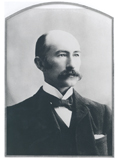 |
Member for Northern Melbourne (Victoria) 1901-1906 |
|
Born in Newtownards, Down, Ireland, Henry Higgins migrated to Melbourne, Victoria with his family in 1870. Higgins graduated in law from Melbourne University, was admitted to the Victorian Bar in 1876, and had a successful career in equity law before entering politics. In 1894 he was elected to the Victorian Legislative Assembly as the member for Geelong.
Higgins was an influential delegate at the Australasian Federal Convention of 1897-98, where he spoke against equal representation of the states in the Senate, and was responsible for clauses in the Constitution giving industrial powers to the Commonwealth and guaranteeing religious freedom to individuals. Higgins opposed the Constitution Bill in the referendums of 1898-99, believing that the Constitution it proposed was rigid and oppressive.
In 1901 Higgins was elected to the seat of North Melbourne in the House of Representatives. A radical Protectionist, he was elected with the support of the labour movement, but although he supported Labor’s program in the first Parliament, he did not join the Labor Party. He was Attorney-General in Watson’s Labor Government of 1904. In 1905 Higgins successfully moved a resolution in the House of Representatives urging Britain to grant Home Rule to Ireland.
Higgins was appointed justice of the High Court of Australia in 1906, and in 1907 replaced Richard O’Connor as President of the Commonwealth Court of Conciliation and Arbitration. There he was responsible for decisions with far-reaching repercussions for industrial arbitration and conditions for workers in Australia. Higgins remained on the High Court bench until his death in 1929.
previous | list of members | next
|


